 Petzlover
Petzlover Hungarian Wirehaired Vizsla is originated from Hungary but Old English Sheepdog is originated from United Kingdom. Both Hungarian Wirehaired Vizsla and Old English Sheepdog are having almost same height. Both Hungarian Wirehaired Vizsla and Old English Sheepdog are having almost same weight. Hungarian Wirehaired Vizsla may live 3 years more than Old English Sheepdog. Both Hungarian Wirehaired Vizsla and Old English Sheepdog has same litter size. Hungarian Wirehaired Vizsla requires Low Maintenance. But Old English Sheepdog requires Moderate Maintenance
Hungarian Wirehaired Vizsla is originated from Hungary but Old English Sheepdog is originated from United Kingdom. Both Hungarian Wirehaired Vizsla and Old English Sheepdog are having almost same height. Both Hungarian Wirehaired Vizsla and Old English Sheepdog are having almost same weight. Hungarian Wirehaired Vizsla may live 3 years more than Old English Sheepdog. Both Hungarian Wirehaired Vizsla and Old English Sheepdog has same litter size. Hungarian Wirehaired Vizsla requires Low Maintenance. But Old English Sheepdog requires Moderate Maintenance
 In the 1930’s some breeders noticed that the Hungarian Vizsla produced some dogs with more water, cold weather and ground cover protection because they had a much thicker coat than most of the breed. One breeder decided to cross one of these females with a German Wirehaired Pointer, thus producing the first Hungarian Wirehaired Vizsla. There were now three types of Vizsla – the smooth coated, the longhaired, and the wirehaired. The longhaired is very rare and can be either smooth or wirehaired. It is also believed based on anecdotal evidence that the original Wirehaired Vizsla was also mixed with the Bloodhound, Pudelpointer, and Irish Setter during World War II. Many kennels started breeding the Wirehaired Vizsla at this time.
In the 1930’s some breeders noticed that the Hungarian Vizsla produced some dogs with more water, cold weather and ground cover protection because they had a much thicker coat than most of the breed. One breeder decided to cross one of these females with a German Wirehaired Pointer, thus producing the first Hungarian Wirehaired Vizsla. There were now three types of Vizsla – the smooth coated, the longhaired, and the wirehaired. The longhaired is very rare and can be either smooth or wirehaired. It is also believed based on anecdotal evidence that the original Wirehaired Vizsla was also mixed with the Bloodhound, Pudelpointer, and Irish Setter during World War II. Many kennels started breeding the Wirehaired Vizsla at this time.
This rare longhaired is not recognized by any official club or organization while the smooth and the wired are recognized as two separate breeds. There are only a few longhaired Vizsla and they are only found in Europe. The Wirehaired Vizsla was recognized in 1986 by the FCI in Europe and in 2014 by the AKC (American Kennel Club).
Like their cousins the smooth Hungarian Vizsla, the wirehaired version is a natural hunter and easily trained. They are great retrievers as well as pointers in the water or on the land. Their wirehair coats offer them more protection than their smooth coated cousins. They love to swim and are very good at it and will even use your back yard pool if it is available to them.
The wirehaired Vizsla came to North America in the 1970’s and was recognized by the CKC (Canadian Kennel Club) in 1977, The North American Versatile Hunting Dog Association (NAVHDA) by 1986 and in 2006 by the United Kennel Club (UKC). The Australian Nation Kennel Council offered recognition in 2007 prior to their entrance into the AKC Foundation Stock Service. They began showing the breed at AKC events in Performance and Companionship, prior to their full AKC recognition in 2014.
These gentle hunting dogs became great family dogs as they love children and just want to be with their people. Falconers have recently taken up the breed because their temperament is suited to this work as well. There are only about 400 to 450 Wirehaired Vizslas left in the United States and few thousand across the globe.
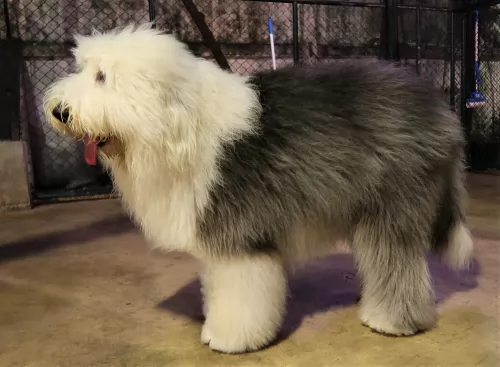 The origin of the Old English Sheepdog is unclear as records weren’t kept. However there are some aspects that suggest the dog originated in the 19th century and that the Scottish Bearded Collie had a significant part in the development of this dog which hails from England.
The origin of the Old English Sheepdog is unclear as records weren’t kept. However there are some aspects that suggest the dog originated in the 19th century and that the Scottish Bearded Collie had a significant part in the development of this dog which hails from England.
It is also believed that the Russian Owtchar was involved in the development of the Old English Sheepdog. The dog was recognized by the American Kennel Club in 1888. In 1904, the Old English Sheepdog Club of America was also founded.
The shape of the dog has changed very little over the years and it was in the 1880s that the dog was exported to the United States.
 Very much like his cousins, the Wirehaired Vizsla is a noble looking breed. He is lean and muscular with a noble head and moderate skull line. Their muzzle is just a little shorter than the skull and the end is squared. They have powerful jaws and a broad, wide nostrils. The nose is brown, and the eyes are slightly darker than the dog’s coat color.
Very much like his cousins, the Wirehaired Vizsla is a noble looking breed. He is lean and muscular with a noble head and moderate skull line. Their muzzle is just a little shorter than the skull and the end is squared. They have powerful jaws and a broad, wide nostrils. The nose is brown, and the eyes are slightly darker than the dog’s coat color.
Low set ears are long and hang near the cheeks. With a strong, long neck and muscular shoulders, the Wirehaired Vizsla certainly looks the part of a hunting dog. Her chest is a little deep and the breastbone is prominent. She has round paws with short nails. Of course, her coat is wiry and dense. The undercoat is water repellent. He has an intelligent and lively facial expression.
Their ears are long but proportionate to the head and body. Their upper teeth overlap the lower teeth. Finally, the tail is thick and usually 1/3 docked. The tail is mostly carried in a horizontal position while walking or running.
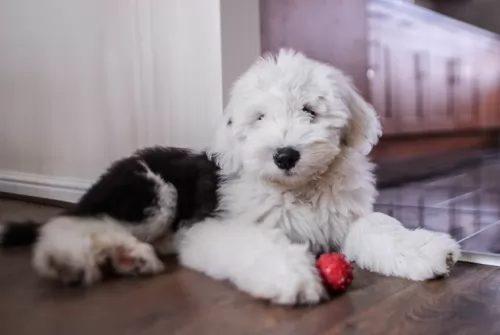 The Old English Sheepdog is a large dog standing at between 50 and 60cm and weighing between 27 and 45kg.
The Old English Sheepdog is a large dog standing at between 50 and 60cm and weighing between 27 and 45kg.
He is muscular with a broad bottom and hip area. The head is also large and the small ears are carried flat. The tail has always been docked, giving the dog a large panda-bear look to him, but these days the tail is often left long, and the dog loses that square compact look.
When the tail is left long it is well feathered. The coat can become fairly long and is quite harsh and wavy to straight. The coat is essentially grey with white hair over the head area. The puppies are born with their hair being black and white, and later on the traditional grey coloring comes in.
What is quite interesting with this dog is that it stands lower at the shoulder than at the loins, so just like a Panda bear, he also lopes or walks in a bear-like fashion.
The Old English Sheepdog isn’t an aggressive dog. He is social, intelligent and entertaining for his human family, whom he loves to spend time with.
He is an energetic dog too and he would prefer a country setting where there are large fields to run in as opposed to living on a tiny property in the city. He is an adaptable dog though, and will slot into life in the city or suburbs, so long as he is well exercised.
Train him and socialize him and he will become an obedient, amicable pet to have around.
 Very good with children as long as he gets enough exercise.
Very good with children as long as he gets enough exercise.
Very athletic
A puppy could live in an apartment in the city, but the adult dog needs a yard and is better off on a farm.
Very smart, very responsive, high learning ability.
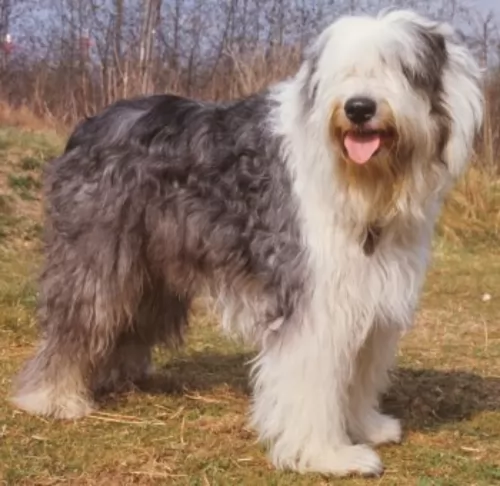 The Old English Sheepdog is the ideal dog for a family pet. They love spending time with their human family and are affectionate and loyal, getting on well with children as well as other pets.
The Old English Sheepdog is the ideal dog for a family pet. They love spending time with their human family and are affectionate and loyal, getting on well with children as well as other pets.
From the time he is a puppy, you can see that he is fun-loving and easy going while also being intelligent. He is also a guardian and wants to protect his human family.
Provide him with the opportunity to get out into the country sometimes if you don’t live on a farm because he is essentially a farm dog. He used to be a herding dog and likes to be busy. Treat him well and have him trained and socialized and he’ll make you a superb pet.
 Mostly healthy but the Hungarian Wirehaired Vizsla does have some inherited dispositions to:
Mostly healthy but the Hungarian Wirehaired Vizsla does have some inherited dispositions to:
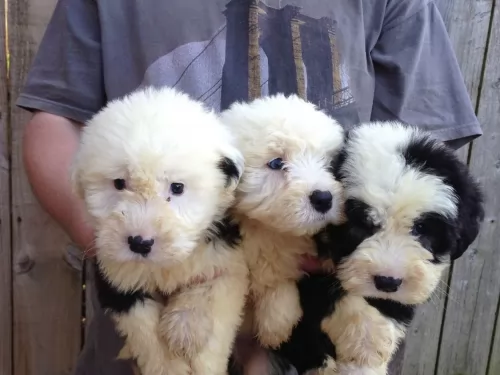 It is estimated that the beautiful Old English Sheepdog can live to be about 10, 11 or 12 years of age if he is looked after well. Just like with other dog breeds though, this particular dog is also prone to some of the common dog diseases there are.
It is estimated that the beautiful Old English Sheepdog can live to be about 10, 11 or 12 years of age if he is looked after well. Just like with other dog breeds though, this particular dog is also prone to some of the common dog diseases there are.
Some of these diseases include hip dysplasia, diabetes, eye diseases and deafness along with some skin problems.
As a chronic disease, Diabetes can affect dogs as well as other animals and humans. Diabetes in dogs can’t be cured but it can be managed, with Diabetes Mellitus being the kind of diabetes most seen in dogs. Whatever kind of diabetes your pet has, the negative effects remain the same.
It can be devastating when your dog has been with you for about 10 years, to discover that he has cancer. Of course, cancer is the leading cause of death found in dogs older than the age of 10.
Many cancers are curable if you catch them early. Malignant lymphoma is a common cancer with dogs but there are other cancers too. The warning signs of cancer in dogs are much the same as what you get with humans. You’ll discover a lump or even an injury that won’t heal. There could also be abnormal bleeding.
There are many different kinds of skin problems seen in dogs, some of which are more common than others. You’ll notice your dog licking a part of the body so that the hair disappears and the skin becomes exposed.
There are skin problems started because of inadequate diet and lack of nutrition. There are plenty of commercially manufactured pet foods that don’t have the right amount of vitamins and minerals your pet needs. Always buy a good quality one to fight these very aggravating skin allergies. A vet may give hydrocortisone products but many dog owners these days try to treat their dogs with natural products.
 Feed high quality food for medium to large breed puppies. Feed 3-4 time a day 1-2 cups.
Feed high quality food for medium to large breed puppies. Feed 3-4 time a day 1-2 cups.
Feed high quality food for adult medium to large dogs. Feed 2x a day 2-3 cups.
Great stamina and very athletic breed.
The Wirehaired Vizsla is a working dog and needs serious daily exercise. He will be full of energy and excitement if he doesn’t get enough mental and physical stimulation. He needs a family that can walk a mole or two every day or jog with him. He easily becomes neurotic and high-strung if his energy is not dissipated. Excels at Field Trials, Competitive Obedience, tracking and Barn Hunt.
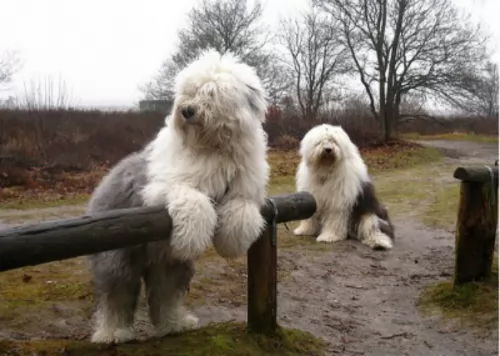 Food allergies are caused by your dog eating food with ‘bad’ ingredients which don’t agree with him. Make sure your pet has a wholesome diet.
Food allergies are caused by your dog eating food with ‘bad’ ingredients which don’t agree with him. Make sure your pet has a wholesome diet.
Invest in the very best quality commercially manufactured food. Home-made food is always a wonderful treat for any dog but it needs to be kept simple. No exotic, spicy foods and no suddenly changing your pet’s diet.
Simple, nutritional boiled chicken, brown rice or pasta and vegetables such as sweet potato, carrots and spinach added into his kibble as a treat will do wonders for your pet and he will thank you for keeping his meals tasty and simple. A little bit of raw meat added in occasionally can also do him the world of good. Fresh, cool water must always be available.
The Old English Sheepdog is quite a high maintenance dog, what with that long hair and all, and some owners of this dog prefer to take him to the parlor to have the hair sheared and wash, otherwise it could become a mammoth task for a dog owner.
If you opt to keep the hair long, you may end up having to be constantly brushing your pet’s coat to prevent it tangling. Not only that, if you live in a hot area, cutting the hair can help towards keeping the dog cool.
The ears of your dog should be checked regularly for infection as well as the eyes, and keep the nails clipped as well.